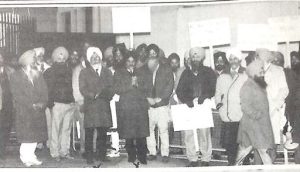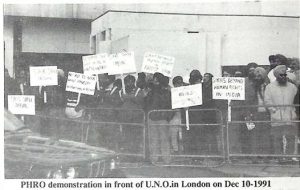

Punjab Human Rights Organization (PHRO) is & nonparty human rights movement in the State of Punjab where the people especially the Sikhs are struggling actively for the last decade to secure their basic rights including the right of self-determination as enshrined in the UN Charter of Human Rights. The PHRO is dedicated to humanistic and democratic values. It has a selective membership drawn from a variety of disciplines: Law, Journalism, Education, Medicine, Agriculture, Trade and Industry. Since its inception in 1985, the PHRO has been endeavoring to investigate and publicize the violations of human rights in Punjab, Kashmir and elsewhere in India at the hands of the Indian law enforcing agencies, state sponsored Vigilantes and individual groups. Because of its working in this part of the country, the PHRO opposes tooth and nail the oppression of the Sikh and Muslim minorities in Punjab and Kashmir. It also suggests ways on how to resolve the Punjab conflict.
The PRHO does not view the Punjab turmoil merely in terms of “terrorists violence” as cynically done by the Indian ruling circles and presented to the world by their well-oiled propaganda machines. We see a deeper meaning in the unending unrest. Viewed in its historical, sociological and political context, the Punjab problem certainly emerges as an important chapter in the struggle for human dignity, freedom and equality, a part and parcel of the currently evident global phenomenon. Sikhs are not the only segment of the Indian population which is struggling for their rights. The others in the line are Kashmiris, Assamese, Oriyas and Tamils. All are seeking to emancipate from the neocolonial clutches of Delhi, The deployment of tens of thousands farmed security forces in Punjab, Kashmir and Assam for years together make these regions occupied territories.
Thousands of Sikhs and non Sikhs have been killed during the past few years. A large number of Sikh activists have been Killed at the hands of the security forces. The paramilitary and the police forces have been responsible for grave human rights abuses. The Indian army deployed in Punjab often engages itself in “encounters” with the Sikhs. No one from the military or paramilitary forces responsible for extrajudicial actions has so far been punished.
Thousands others were tortured, disabled and detained without trial for years together. Extortion of money for the release of persons illegally detained at unofficial police posts was frequent. The PHRO enquired into and reported about some of these abuses of law. It was unthinkable to investigate all the complaints received by it A few other human rights {groups and journalists also went into some of the instances. No known international human rights organization like Amnesty International was permitted to enter Punjab to find out the human rights, situation for about a decade. We in PHRO with its small voice did try to defend and promote the civil liberties, human and basic rights, of the people and the State of Punjab. The purpose was to keep high the public morale and to highlight the need for restoring civil liberties and democratic rights brutally crushed by Delhi in and after 1984.
PHRO regularly receives information of abductions and illegal detentions the Sikhs at the hands of the state law forcing agencies on the mere suspicion of being members or sympathizers of the Sikh militant groups advocating for Khalistan, In some cases the detainees are eventually found to have died in custody, in others they are found to have been deliberately killed in custody. The officials wrongly report that they died in armed “encounters” with the police. Violent activity at the hands of military paramilitary and police forces remains unchecked. Rather, it has further been stepped up on the pretext of holding elections in Punjab. Security forces excesses are on the increase.
The PHRO documented a series of reports parallel to the international norms and standards exposing false encounters killings, rape of women and torture cases besides general harassment and humiliation of the civilians by the security forces. Mast of these reports have been printed in form of books by its head office which include Punjab Bulldozed A report to the World on Operation Black Thunder II (May 9-18,1988), Bidar -A nail in the coffin of Indian Unity (Sept.5,1988), Judicial Murder? A representation to the President of India on death sentences of Bhai Satwant Singh and Kehar Singh in the Indira Gandhi assassination case, The Jammu Sikh Camage (Jan.13,1989), The Fascist Offensive in Punjab Reports on human rights violations (Feb.2,1986May 21,1989), The Rape of Punjab Reports on Indian States indignities on Sikh women, and children (March 8,1989), An Indian Torture ChamberThe full story of Ladha Kothi Jan.5,1990), 1 Swear A collection of 20 affidavits on violations of human rights in Punjab (March,1990)and Sikhism and Human Rights A report of a seminar held by PHRO (March 12,1989).
The organization after setting up its branches abroad produced number of publications such as Implement the Constitution First and Talk Later. A letter to the Prime Minister on how to resolve the Punjab crisis (Dec.14,1989), Post-Election Human Rights Situation in Punjab Jan, 12,1990), Set Free Ranjit Singh Gill and Sukh minder Singh Sandhu A representation to the US Secretary of State (Feb.7,1990), Renewed Human Rights Abuses in Punjab .A report on Bhatinda incidents (Feb.28,1990), How India Disregards its Courts A cause of Darshan Singh Dallas disappearance (April 6,1990), India’s Secret Black holes (May 1,1990), The Taste of the Hell A Sikh youths experiences while in police captivity (May 29,1990), The Kashmir Massacre July 1990), Why I Took to A.K.47 (Oct.22,1990), Ram Janam Bhoomi A Myth (Oct.1990),and Sikh Villages Ransacked (Nov.1990).
During 1990 the PHRO has produced four books, “Chander Shekhar’s Multipronged Offensive in Punjab”, “The Rape of Sikh Women”, “The Fourth Estate as Fifth Column” and “The Collapse of Judicial System in India”, compiling various PHRO investigation reports and national and International events concerning human rights. Among the investigation reports, the important ones are The Killings by police “cats”, the policemen as kidnappers and extortionists, cases of rape both by police and individuals in militants garb, the crackdown on the Press, Police help extortionists, the state officials are afraid of the police, the Pilibhit Sikh carnage, SSP Sumedh Saini the terrorist, the court officials fired upon and Sikh women gang raped by Indian Army.
PHROs approach to elections Point Poster, an eight page handout was also freely circulated among the people in May 1991.
Most of the PHRO reports have been reprinted and distributed the world over by its branches abroad. These branches besides disseminating the literature have created lobby in the international community especially among parliamentarians in Europe and North America. Because of these reports and the lobby, the PHRO is a worldwide movement known in human rights field particularly in the western countries.
To mobilize the public opinion and the people of Punjab, the PHRO formed an Anti-Repression Coordination Committee (ARCO) to collectively oppose state terrorism in July, 1986. The ARC comprised a dozen of nonparty Punjab organizations. The ARC organized an “All India Anti Repression Convention” in defence of human rights and against state repression on August 3,1986 at Gandhi Smark Bhawan, Chandigarh which was attended by representatives of various human rights groups working in India, Secondly, an “anti-repression mass rally presided over by Nag Bhushan Patnaik’s, Chairman, Indian Peoples Front, was organized at Bhatinda on Sept7,1986. The Third rally was organized at Jalandhar on (Oct5, 1986 which was chaired by Dr. Aurobindo Ghose, Convenor of the Delhi based Peoples Rights Organization (PRO). State repression, “black laws”, fake encounter’s, suppression of the Press and inaction of the Center to punish persons responsible for the November 1984 Sikh carnage were condemned. The rallies demanded the release of Jodhpur detainees and political prisoners general amnesty and rehabilitation of army deserters, scrapping of “black laws” and prosecution of the persons responsible for killing, of Sikh youths in faked encounters. The measures to check fake encounters in Punjab ,repression on Dalit’s as in case of Bihar and the need for coordination with national and international human rights groups were also discussed at these meets.
D.S.Gill Chairman, PHRO
Article extracted from this publication >> January 24, 1992